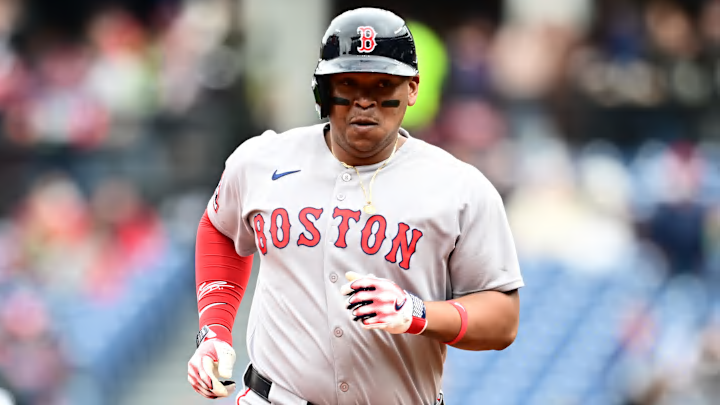The Boston Red Sox have a Rafael Devers-sized problem on their hands, but the solution might not be as simple as "trade him."
First of all, Alex Bregman can opt out of his contract after this year, which would leave the Red Sox without a third baseman. Perhaps the more glaring issue, though, is Devers' trade value (or lack thereof).
It's natural for any fanbase to inflate the value of one of their team's top players on the trade market. But would trading Devers actually net a juicy enough return for the Red Sox to seriously consider it?
MLB Network analyst Brian Kenny explored this very topic Tuesday on MLB Now, and one thing is certain: Devers will not be viewed as a bonafide superstar on the trade market, no matter how hard he hits the ball.
What is Rafael Devers' value on the trade market?
— MLB Now (@MLBNow) May 13, 2025
BK digs in. pic.twitter.com/830UvcxWKH
MLB Network may have just confirmed why Rafael Devers won’t be traded
First and foremost, Kenny urged viewers to dispel with any wildly unrealistic expectations about Devers' trade value.
"He doesn't pitch or hit like [Shohei] Ohtani," Kenny said. "He doesn't hit like [Juan] Soto, who is also two years younger. So, get that $700 million thing out of your head."
Of course, Kenny acknowledged, Devers is a very good hitter. He just isn't a legitimate superstar. Even though his Statcast numbers from this season are excellent – he's in the 94th percentile for both xWOBA (.417) and average exit velocity (95.7 mph), and the 100th percentile for hard-hit percentage (61.9) – some of his underlying metrics give cause for concern.
"When he hits the ball, he smokes the ball, and he does that at a superstar level," Kenny said. "As for the rest of his game, well, that's the issue, isn't it? The whole thing started this year because the Red Sox saw the need to replace him at third base defensively."
Devers was worth minus-9 defensive runs saved in 2024, so Bregman – fresh off a Gold Glove-winning season, no less – was clearly a defensive upgrade at third. But Devers' defense isn't the only concern.
"Beyond that, he's also not good on the bases," Kenny said. "He's been below average in base running runs each of the last five years, and that's ages 24 to 28. It's his prime. So he's a big hitter in his prime, but he's a player that's also earned his spot at designated hitter and now is not accepting a move over to first base."
There's also the not-so-small matter of Devers' contract. At age 28, he is only in the second season of a 10-year deal in which he is owed approximately $30 million per year over the next nine years.
"The $30 million a year player is a franchise player," Kenny said. "That's still real money. An aircraft carrier – Manny Machado, Corey Seager, Trea Turner. Those guys, though, are still playing tough defensive positions out on the field. Devers is not."
Based on OPS+ and runs created, that leaves Pete Alonso of the New York Mets and Kyle Schwarber of the Philadelphia Phillies as Devers' closest comps. The former is in the first season of a two-year, $54 million contract ($27 million AAV), while the latter is in the final season of a four-year, $79 million deal ($19.75 million AAV).
Based on that logic, Devers' $30 million annual salary — while not among the highest in baseball — still looks like an overpay for a DH. The Red Sox are going to have an awfully hard time convincing any other team to take that contract off their hands, and that's not even considering the off-field drama.
More Red Sox content from BoSox Injection
